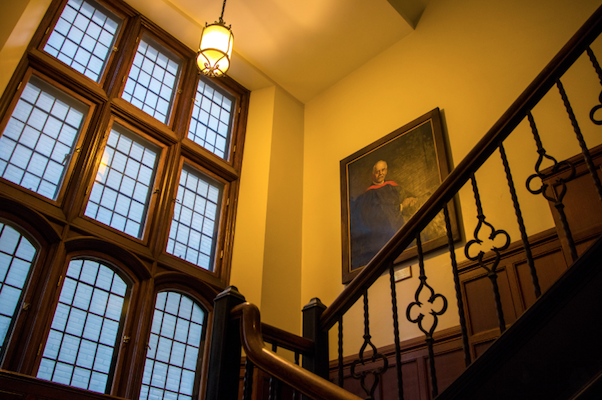Montreal’s Council for Research on Religion (CREOR-M) hosted its first Colloquium on Religion and Climate Change in the Birks building. The event, held on Sept. 20, aimed to bring together McGill scholars from different fields to discuss how understanding faith can recontextualize the movement for climate justice.
According to Claire Grenier, U2 Joint Honours Western Religions and Political Science and speaker at the colloquium, religious people have a vital role to play in the fight for climate justice. Claire hoped the colloquium would allow participants to understand the intersection between religion and environmental activism.
“The potential of this conference is to expose a lot of different people to different viewpoints, especially in different religions,” Grenier said. “There are religious people that see a social responsibility and a tenant of hospitality that extends not just to people that share their views, but to people around the world.”
Religious Studies Professor Lei Kuan Lai spoke on religion in activism in their talk, “A Buddhist Environmental Ethics?” as well as how religion can be used as a tool against climate action; Lai explained that scholarship using Buddhist doctrine to claim that Buddhism and environmentalism are perfectly compatible oversimplifies Buddhist thought. As an example, Lai explained that Pure Land, an ideal space where enlightenment is easily achieved, is only an ideal of Buddhism when it is presented as being contained within an urban setting.
“[Pure Land] looks more like Mont Royal Park than the wilderness,” Lai said. “One would be hard pressed to say Buddhism is inherently environmental.”
Lai went on to address the approach to Buddhist environmentalism in which scholars attempt to derive environmental principles by applying Buddhist thought. Lai explained that such scholarship emphasizes individual and symbolic action by focusing on mindfulness and reflection. Much of the activism cited in this approach highlights imagery of peaceful Buddhists meditating, reinforcing a tradition of representing Buddhists as soft and passive. This outlook prioritizes activism on the individual level, rather than as a collective; this also promotes passivity, which Lai argues works against creating meaningful change. Additionally, Lai argued that Buddhism must embrace science, in addition to tenants of faith, to take a radical response to a radical problem.
“Romanticizing a nature-loving Eastern tradition has to stop, because it’s impeding a meaningful Buddhist response to the current crisis,” Lai said. “Happiness and mindfulness Buddhism will not stop rising sea levels.”
Religious Studies Professor David Goodin, presenter of “The Abrahamic Religions and Climate Change,” also sees value in incorporating religion in environmental activism. Goodin spoke of the potential for religion to add a uniquely effective moral weight activism.
“The Abrahamic idea of hospitality and care, that is the essence of the religious identity, and [it] can inform [you] of who is your neighbor and how [you should] provide for them,” Goodin said. “I do think it can be a powerful moral force [….] not because of rational self-interest, [though] that’s there too, but because [the climate crisis is an] injustice and it [should] make us angry. And so injustice invites a religious response to say [that] this is wrong.”
The colloquium left participants wondering how to motivate collective action to address climate change. Vienna d’Mato Hall, U3 Arts, expressed their cynicism around the emphasis on student movements, which they believe do nothing to promote activism outside of university. Like Goodin, they were deeply interested in the potential of religion to motivate action against larger societal forces.
“What I care about is activism happening in reality, not just with people that are cushioned by those orchestrating the problem,” d’Mato Hall said. “The reason I came here today is I almost feel like we need a new religion, to unite humanity [so that we can] stay [on earth], and if we want to be here we have to do these things, all of us.”








